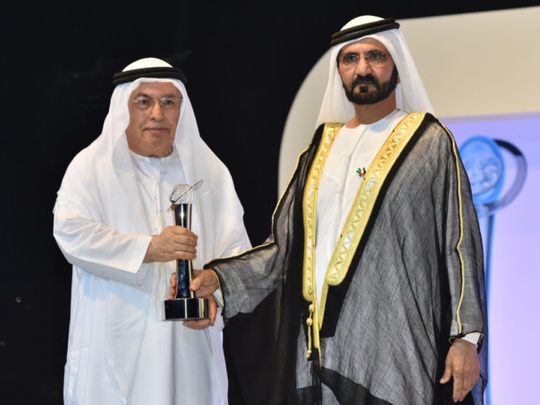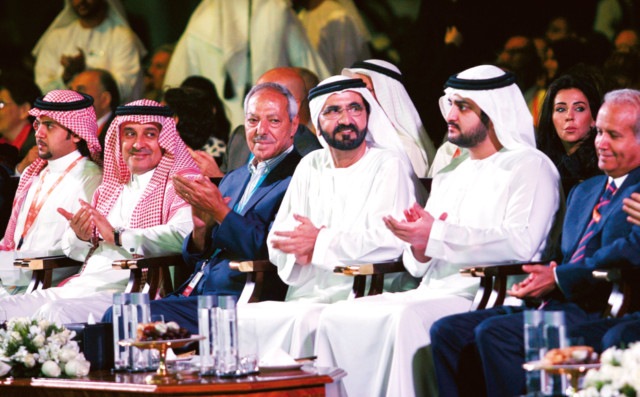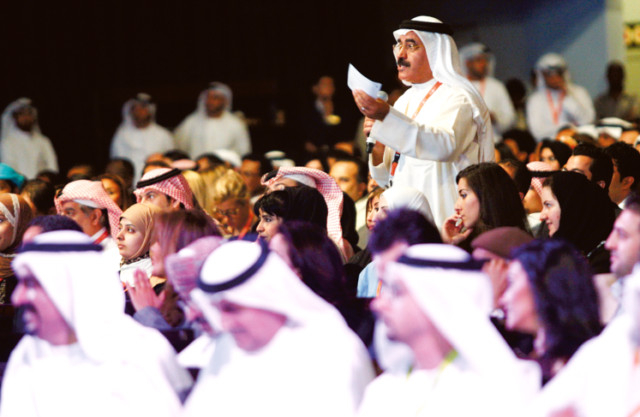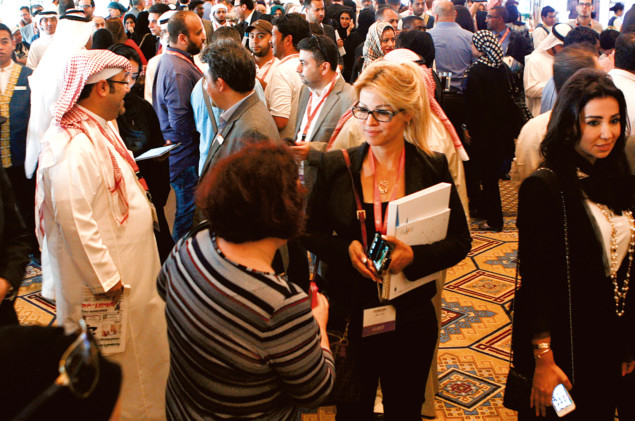
Dubai: The two-day Arab Media Forum 2014 (AMF) concluded on Wednesday in Dubai with the Arab Journalism Awards presented to regional journalists by His Highness Shaikh Mohammad Bin Rashid Al Maktoum, Vice-President and Prime Minister of the UAE and Ruler of Dubai.
The winners, in 131 categories, were awarded at a closing ceremony at the Madinat Arena of Mina A’Salam resort.
Shaikh Mohammad felicitated two award categories – Best Newspaper Columnist (Ahmad Rajab) and Media Personality of the Year (Ebrahim Al Abed).
Also present were Shaikh Hamdan Bin Mohammad Bin Rashid Al Maktoum, Crown Prince of Dubai, and Shaikh Maktoum Bin Mohammad Bin Rashid Al Maktoum, Deputy Ruler of Dubai, and senior officials and media personalities.
Ebrahim Al Abed, director general of the National Media Council, won the Media Personality of the Year award. The Best Newspaper Columnist award conferred on Ahmad Rajab was received on his behalf by Mohammad Toufiq, an Egyptian writer.
Other awards were presented by various media personalities.
There was also a video tribute to Dr Abdullah Omran Taryam, chairman of Dar Al Khaleej newspaper group, who passed away in January.
Some 2,000 people visited the 13th edition of AMF, which featured leading regional media professionals and discussions on the latest trends in the industry and their impact on society.
Delegates noted the rapid rise of social and new media and how young bloggers shot to fame by providing content on user-generated sharing sites such as YouTube and Instagram.
They also debated whether social media, technology and citizen journalism could mark the end of traditional media, such as newspapers, in the coming decades.
Sessions also focused on issues of privacy and censorship in today’s hyper-tech, digitally-wired world. Virtually anyone with a smartphone and internet access has the potential to spread sensitive content around the world — it is common for unplanned or underestimated posts to go viral and be shared by millions of people worldwide.
Major consumers
Studies presented during the media forum suggest that Arabs, particularly the youth, are massive consumers of social media and increasingly see it as their main news source. Still, television remains their top choice for news, according to research cited at AMF. The UAE boasts one of the world’s top user communities in terms of smartphones and social media. Last year alone, 1 million more people joined Facebook in the Emirates, the reports said.
However, the proliferation in online media and technology has also led to daily cyber attacks and harassment online, particularly of women. The devices and software have allowed people to act anonymously, or under fake profiles, making it easier to get away with crime, specialists at AMF said.
Still, the opportunity for media professionals and reporters to use these latest services to their advantage has never been so ripe, they added. The barrage of user uploaded content — live video, photos and leads — has “extended the reach” of journalists to “any big event” on Earth, a top Associated Press official said.
The annual AMF is organised by Dubai Press Club, a founder member of the International Association of Press Clubs.
In an exclusive session at the Arabic Media Forum on Wednesday, Shaikh Waleed Al Ebrahim, Chairman of the MBC group, discussed the highs and lows of his media empire, noting it’s been a long road to establishing his regional channels in the region.
Regional pioneer
Referred to by some as the Father of the Arab Media, Shaikh Waleed recalled the establishment of the MBC channel in 1991, which became the first Arab broadcasting channel in the region.
More than a decade later, the broadcaster boasts 14 TV channels, two radio stations, and has more than 100 million viewers in the Arab world. “We chose to establish the channel in London because back then, Arab countries were relying on government media and the idea of commercial TV was ruled out except in Lebanon,” Shaikh Waleed said.
London served as a refuge and was the only place outside the region to practise freedom of expression, he explained. The second phase of the channel’s development was its move from London to Dubai in 2002. “The decision was fateful,” said Shaikh Waleed, who referred to the cooperation and agreement with Shaikh Mohammad Bin Rashid Al Maktoum as the main reason for the relocation and continuous success of the channel. Surprised at the channel’s development and growing success, Shaikh Waleed noted the change in the media landscape in the wake of the Arab Spring. “Some Arab countries and certain groups are trying to exert pressure to distort the image of the media — the pressures are eternal and external from inside and outside the Arab world.”














